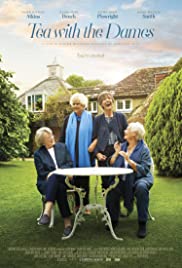
TEA WITH THE DAMES
UK, 2018, 84 minutes, Colour.
Dame Judi Dench, Dame Maggie Smith, Dame Eileen Atkins, Dame Joan Plowright.
Directed by Roger Michel.
If you ever wanted to sit in on a conversation, chat between the four famous Dames, this is definitely the opportunity. Actually, there are very little tea seen, if any, but rather water and champagne! The original title, seen on the clapper boards is the quote from South Pacific, Nothing Like a Dame.
The four senior actresses, in their 80s, agreed to go to Joan Plowright’s home in the countryside and to sit down and talk. There are some conversation with the filming crew, some of the new technicians at their work, and some questions from director, Roger Michel (best known for such films as Notting Hill, Changing Lanes, My Cousin Rachel).
The conversation begins outside in the garden, a sunny afternoon – but rain soon started to fall and everybody having to adjourn inside. And the conversation is very entertaining, the four ladies laughing with great gusto at some of the stories – and the audience somehow rather empathising so strongly that they also laugh at times with great gusto.
The film is based on anecdotes. And it is supported by quite a number of photos, some home movies, some sequences from televised plays, some film clips. In the short amount of time, there are quite a number of clips but are many in the audience would be hoping for even more.
Each of the actresses has quite a distinctive personality. Joan Plowright is the matriarch. She is legally blind, with hearing aids, still bears herself with great dignity, being assisted by a walking stick as well as her daughter guiding her. Questions are asked about her marriage to Laurence Olivier, her status as Lady Olivier, her meeting with the actor, her appearance in The Entertainer, subsequent appearances as well as the story of their children, the travels, his work in the National Theatre. And there are glimpses of Joan Plowright’s appearances on stage and on television. In some ways she is rather proper but she also has a sense of fun and is enjoying the conversation and the memories.
Eileen Atkins is less well-known than the other three women but has had a distinguished career on stage, on television, in cinema. She speaks about her childhood, dancing, moving to acting, appearing in some kind of burlesque. She comments on her stage experience and the actors she has performed with, including her first husband, actor Julian Glover. She has something of a sardonic tone, especially about her appearance, not pretty, but having a talent for acting and enjoying her career. Interestingly, when asked what she would change from her past, she says she would be less angry and less confrontational – something which doesn’t quite appear so strongly during the conversation.
Maggie Smith probably has the widest reputation, beginning in films in the 1950s, having good roles internationally, in the UK and in the US. She won an Oscar in 1969 for The Prime of Miss Jean Brodie, winning another in the 1970s as Best Supporting Actress in California Suite. And, all the time, she was appearing on stage. She has quite a lot of comment, partly teasing Joan Plowright, of how severe Laurence Olivier was with her, with some clips from various performances including the stage and film version of Othello (where, in close-up, he seems rather a ham). With a stage career of more than 50 years, Maggie Smith is particularly well-known. But this film does not include many striking performances including those for playwright, Alan Bennett. She is asked about her relationship with her first husband, Robert Stephens, and there are some scenes of them acting together in a novel card would play. While he had many difficulties, including alcoholism, she says she prefers to remember the happy times. (She knows that she has not had time to look at all of Downton Abbey even though they gave her a box set!)
For the last 20 years, Judi Dench has been quite a significant stage and screen presence. She had performed on stage for many decades, part of the Royal Shakespeare Company in the 1960s. There are also photos and sequences of her performance in Miracle Plays in the early 1950s. With the flashbacks and the clips from plays, she has had quite a range of performances from Cabaret to Cleopatra in Anthony and Cleopatra. There are scenes from Mrs Brown which brought her to the attention of the world of cinema, winning an Oscar the following year for her portrait of Queen Elizabeth in Shakespeare in Love. There are clips from Tea with Mussolini (Joan, Maggie and Judi), from The Best Exotic Marigold Hotel (Judi and Maggie). She has quite a sense of humour, laughing vigorously at so many of the stories – and a surprising angry swearing at an insensitive carer! There are also pictures of her with her husband, Michael Williams, in their televisions series A Fine Romance and on stage.
The conversation ranges widely. It is not a portrait or study in depth. Rather, the audience sees the actresses in themselves, in their performances, in the changes over the decades. They do have quite a lot of commentary about performing, being apprehensive and fearful, techniques, the effect of experiences. There is also a sequence for each of them when they were made Dames, presented by the Queen or by Prince Charles.
This is a pleasure of a film – but, something of a pleasurable treasure for those who admire the actresses.